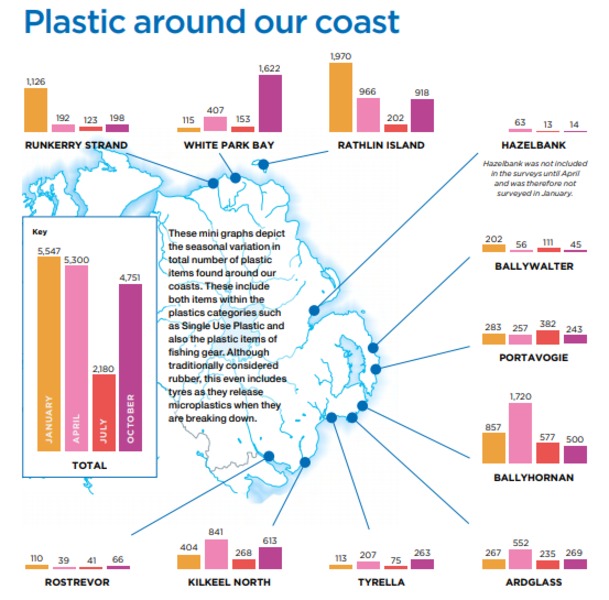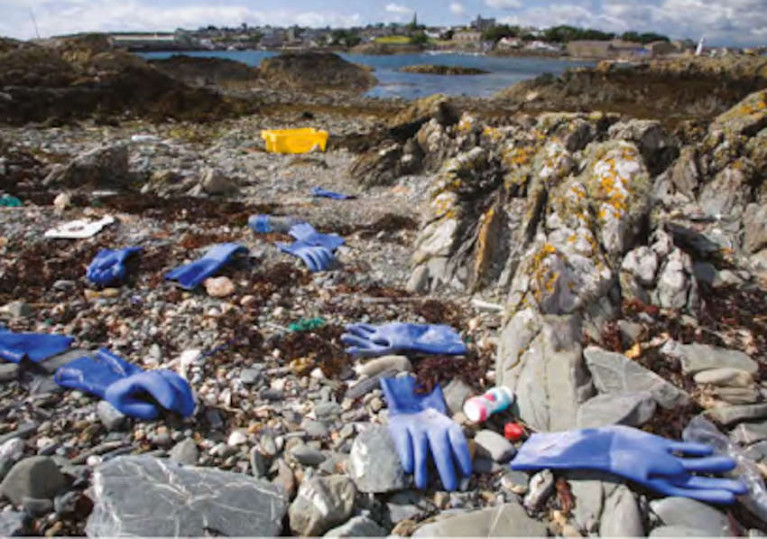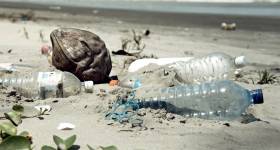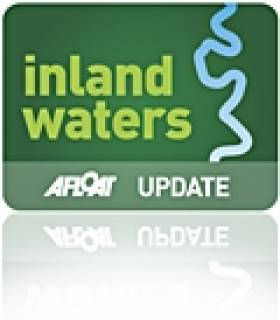Displaying items by tag: litter
Clean Coasts Volunteers Removed 46 Tonnes of Litter as Part of its 'Big Beach Clean'
7,700 Clean Coasts volunteers rolled up their sleeves and removed a staggering 46 tonnes of litter all across the country as part of the Big Beach Clean.
The Big Beach Clean is part of the International Coastal Cleanup (ICC) organised by the Ocean Conservancy, and it entails an annual call-to-action for individuals, families, and communities to join forces to carry out a clean-up at the end of the bathing season and join a worldwide citizen science project.
The Big Beach Clean flagship event took place on Thursday, 28th September, from 10:30 am-12:30 pm in Youghal at Redbarn Beach, in Cork, to wrap up the initiative.
The event marked the end of a successful and busy summer for Clean Coasts volunteers, as well as a celebration of Sustainable Development Goals Week. Among the participants, there were several schools, including 4th class Gaelscoil Chorain, Youghal and Glamire Community College from the city suburbs. Glanmire Community College were eager to collect data about cigarette and vape litter for their BT Young Scientist project.
During the event, volunteers collected an additional 260.5kg of litter, including a couch and door. In addition to the usual litter items, such as cigarette butts and plastic items, volunteers found a Teddy bear and fishing gear.
Youghal had been badly hit by Storm Agnes, with a roof blowing off a building on Front Strand.
This year's Big Beach Clean was also part of Clean Coast's 20th anniversary celebrations, and the charity programme was delighted to see volunteers from all walks of life, including community groups, Tidy Towns associations, students, families, local businesses, and environmental enthusiasts, unite with a shared commitment to tackle marine litter.
Discarded plastic is the predominant form of litter on Northern Ireland’s beaches, according to a new survey by a local environmental group.
As the Belfast Telegraph reports, the survey by Keep Northern Ireland Beautiful estimates that plastic — most of it single-use, such as bottles or food wrappers — accounts for nearly four-fifths of more than three million items of rubbish on NI beaches at any one time.
The figure is projected from on-site surveys in 2019 which recorded an average of more than 500 pieces of litter per 100 metres of beach.

Commenting on the survey, NI Environment Minister Edwin Poots said: “The figures reveal the stark reality of litter on our beaches, with over 22,000 pieces of litter collected across 11 beaches, with 78% of this made from single-use plastic.”
The Belfast Telegraph has more on the story HERE.
Survey Says Just 8% Of Irish Waterside Spots Are Litter-Free
#Litter - Only 8% of beaches, harbours and rivers in Ireland can be considered clean, according to the first national survey on littering at waterside spots.
An Taisce investigated 50 sites nationwide on behalf of the Irish Business Against Litter (IBAL) group and found that just four – Salthill in Galway, Kinsale Harbour in Co Cork, Lanesborough and Carrick-on-Shannon – were clean when measured against EU standards.
Outsider.ie has the full survey results, which point at Cork Harbour and the Wild Atlantic Way as among the biggest offenders for litter blight around the coast.
“We know the success of the Wild Atlantic Way is placing strains on infrastructure of various kinds,” said IBAL spokesperson Conor Horgan. “Litter is a likely consequence of this and one local authorities need to manage to ensure the appeal of the way is sustained.”
Among inland waterways, the Boyne in Drogheda, the Shannon at Portumna, the Suir in Waterford city and the Tolka at Annesley Bridge were considered “heavily littered” — mostly by plastic bottles and drinks cans, cigarette butts and plastic sweet wrappers.
In an editorial earlier this week, The Irish Times warned over “the permanent damage being caused to the marine environment in the form of plastic pollution”.
The issue is one that many campaigners around the country are attempting to tackle – including young Flossie Donnelly and her clean-up efforts in Dun Laoghaire Harbour.
It’s also considered a threat to Ireland’s angling resource. “Our waterways and the fish which they sustain are one of our great natural assets,” said Suzanne Campion, head of business development at Inland Fisheries Ireland (IFI).
“Ireland has a reputation as an outstanding angling destination however this is reliant on our ‘green’ image. We are disappointed to learn that angling destinations such as the Boyne, Shannon, Suir and Tolka feature on the ‘heavily littered’ list.”
IFI promotes a ‘leave no trace’ ethos with anglers and all water users, and Campion appealed to the public “to refrain from littering in or around our waterways”.
Campion added: “If we are to ensure the sustainability of the resource in the long term and to safeguard Ireland’s enduring appeal within the world of angling then we each need to quickly remedy this litter issue.”
As previously noted on Afloat.ie, Doolin ferry operator Eugene Garrihy hit out at the IBAL’s claims that the Clare town is a “litter blackspot”.
'Big Spring Clean' Underway In Fermanagh Waterway
#InlandWaterways - The Belfast Telegraph reports on the annual clean-up of the Glendarragh River in Co Fermanagh by local anglers determined to preserve the quality and natural beauty of their inland waterways resource.
The Kesh and District Angling Club's yearly Big Spring Clean anti-litter drives sees anglers and other volunteers boat along the watercourse to remove as much rubbish and discarded debris as they can find.
As the only waterway in the area where cruisers - many carrying tourists - can travel upstream from Lough Erne, the ugly sight of built-up litter reflects badly on the Fermanagh lakelands, according to club chair Stephen Hey.
"Over the years the water quality has been getting better, but from an aesthetic point of view it's terribly sad to come up the river on a boat and see a rubbish tip." he said, adding that suspected fly-tipping is the cause of much of the waste.
The Belfast Telegraph has more on the story HERE.
NI Minister Brings Forward Marine Litter Strategy
Stormont's environment minister has called for a marine litter strategy in Northern Ireland.
UTV News reports that Alex Attwood joined thousands of volunteers taking part in a morning cleanup on the shores of Belfast Lough for the Marine Conservation Society's Beachwatch Big Weekend.
The minister said he has demanded that his department implement a marine litter strategy to deal waste washing in from the sea.
"Our coast is a great asset and we must keep it in good order," he said. "Marine litter is widespread and the problem can only be tackled at the source.
"I am amazed at the variety of plastic debris and packaging that we have found."
Beachwatch Big Weekend took place across the UK as part of the Ocean Conservancy's International Coastal Cleanup.



























































